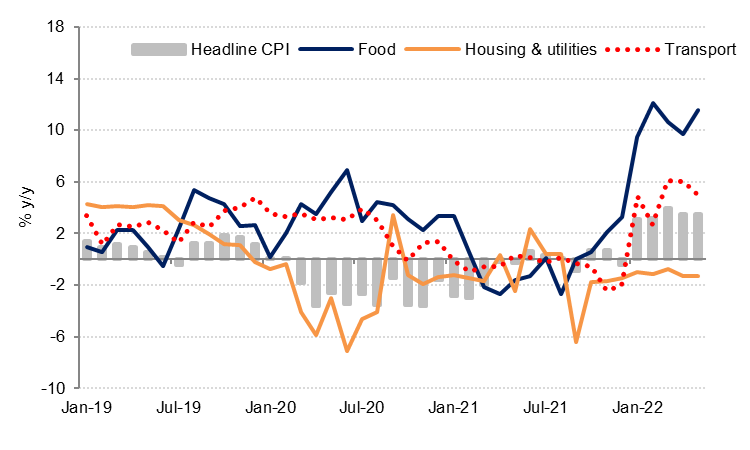
Bahrain’s economy grew 5.5% y/y in Q1 2022, despite a -4.6% y/y contraction in the oil and gas sector. Non-oil sector growth accelerated to 7.9% y/y from 4.2% in Q4 2021, the fastest non-oil sector growth in almost a decade. Government services GDP grew by more than 6% y/y, much faster than in recent years, while manufacturing and utilities also rebounded strongly. Hospitality and transport & communications posed double digit growth on an annual basis, of the low base of Q1 2021, when many Covid-related restrictions were still in place. We expect growth to moderate in the coming quarters, with full year GDP growth forecast at 3.4% in 2022.
CPI has accelerated in the first five months of this year, averaging 3.5% y/y, largely due to the doubling of the VAT rate to 10% on January 1. Food inflation has accelerated sharply to 11.6% y/y in May from 3.3% in December 2021, but this has been due to higher global food prices rather than the increase in VAT, as around 94 basic food products are exempt from VAT in Bahrain. Restaurant prices and transport costs have been other key drivers of inflation this year. Although petrol prices in Bahrain have remained stable this year, the transport component of the CPI likely reflects higher prices for other goods and services including new and used vehicles, parts and service costs, airfares etc. We expect inflation to average 3.3% this year, up from -0.6% in 2022.
 Source: Haver Analytics, Emirates NBD Research
Source: Haver Analytics, Emirates NBD Research
Bahrain’s current account recorded a surplus of USD 1.5bn in Q1 2022 from a deficit of -USD 288mn in Q1 2021, on sharply higher oil and non-oil exports. Total export revenue was up 66% y/y in Q1 2022 while import growth was up 28% y/y. We expect the current account to record a surplus of USD 4.2bn this year, 9.1% of GDP, the largest surplus in more than a decade. Net foreign assets at the central bank have declined to USD 3.3bn as of April 2022, down from USD4.3bn in February. With the import bill expected to rise this year relative to 2021, import cover has declined to below 2 months (based on expected monthly imports in 2022).
We expect the budget to record a surplus for the first time since 2008. We’ve pencilled in a surplus of 3.6% of GDP in 2022 and 3.2% of GDP in 2023, assuming an average oil price of USD 113/b in 2022 and USD 100/b in 2023.
Finally, on the political side, there was a significant cabinet reshuffle mid-June which saw 17 out of 22 ministers changed and the appointment of four new women ministers. Mohammed bin Mubarak Bin Dainah, the former climate affairs minister, was appointed as minister of oil and environment. The reshuffle indicates a strong commitment to continued reform in Bahrain.